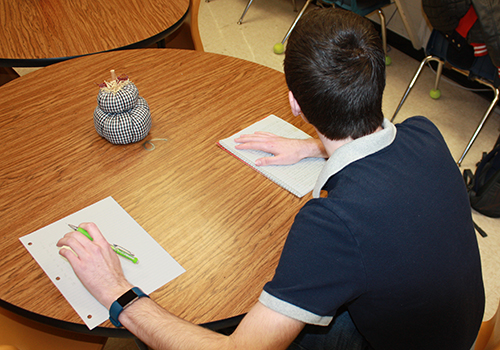
Freshman Daniel Lackey pretends to cheat on a vocab quiz.
The not-so-secret secret
Battle over cheating continues
January 18, 2018
It starts off innocently enough.
“Did you do the English homework?”
“Yeah, did you?”
“No, can I see yours?”
“Sure, I don’t see why not. Just don’t copy it word for word. I don’t want it to look like we cheated.”
And so it begins, the not-so-secret secret of cheating.
Every day since the beginning of public education, students, teachers, and administrators struggle with cheating and academic dishonesty at school, home and online. Consequences range from a lesser grade to expulsion.
What is cheating?
“[Cheating is] being dishonest about what you’re responsible of doing,” Spanish teacher Tracy Hernandez said.
No matter the subject, teachers agree on a definition of cheating.
“Passing someone else’s work as their own,” geography teacher Julian Johnson said. “It happens more than we think it does.”
Although teachers agree cheating is wrong, students struggle to see the issue.
“Everybody does it,” junior Sean Gunther said. “The people who cheat don’t see it as (unacceptable).”
However, the school district policy outlines its definitions of academic dishonesty:
- “Giving or receiving information, looking on someone else’s work, or allowing someone else to see one’s work during an exam, test, or quiz.
- “Giving out unauthorized receipt or distribution of exam, test, or quiz contents, materials, or answer key.
- “Use of unauthorized resources such as notes, cell phones, or other electronic devices during an exam.
- “Taking an exam, producing a project, paper or assignment for another student or asking someone to take an exam or produce a project, paper or assignment for an individual.
- “Copying work assigned to be done independently or letting others copy one’s work.”
How does cheating occur?
Cheating takes place everywhere: from simple homework to large tests and quizzes. “I’ve cheated in algebra with a calculator,” a student who wishes to remain anonymous said. “I had my friend from a previous class leave them on a calculator and tell me which one so I could use it.”
Another student witnessed one of his/her classmates copying a picture of homework off of their phones.
Cheating happens right in front of us everyday, yet we still allow it to happen and students still continue to do it. It is not just a simple way to get a good grade on homework or an assignment, it is something that people would rather do then taking time and effort to learn on their own, but it does not only have to do with not wanting to learn, cheating is also a type of “survival” for students who do not understanding a subject or are not allowed to learn at their own pace.
Why does cheating occur?
“Kids in AP or pre-AP classes mostly cheat due to stress of passing or failing,” counselor Christine Rostedt said. “They fear either not getting into a good college or letting their parents down.”
This is one example of the anxiety students feel, giving them the need to cheat just to make it through a class.
Teachers and administrators feel, for this reason, that the school should start holistic grading. “Have it performance-based instead of pencil-paper tests,” she said. “The days of paper are gone. We have to reevaluate the way we assess.”
While some students give in to the circumstances, others realize the consequences.
“Man, I wouldn’t want to get caught cheating,” junior Tristan Gill said.
